

Jennetta Biberston
Stephany Poseley, Broker - Apple Valley, CA Real Estate Agent. How a Covid-19 Vaccine Could End Up Helping the Virus Spread. A vaccine that protects against symptoms of Covid-19 could contribute to the spread of the disease if—and this is still just an if—the people who get vaccinated remain capable of carrying and transmitting the virus.
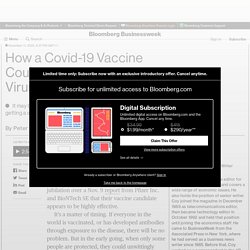
That’s a risk that’s gotten little attention amid the deserved jubilation over a Nov. 9 report from Pfizer Inc. and BioNTech SE that their vaccine candidate appears to be highly effective. It’s a matter of timing. If everyone in the world is vaccinated, or has developed antibodies through exposure to the disease, there will be no problem. But in the early going, when only some people are protected, they could unwittingly spread the disease to people who are still vulnerable. The vaccinated people might stop wearing masks and social distancing since they aren’t themselves at risk anymore. Métiers biodiversité. Développement durable / Ecologie / biodiversité. Explained: Why RNA vaccines for Covid-19 raced to the front of the pack. Developing and testing a new vaccine typically takes at least 12 to 18 months.
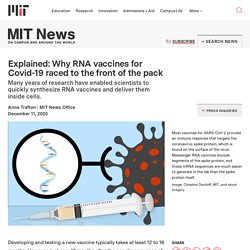
However, just over 10 months after the genetic sequence of the SARS-CoV-2 virus was published, two pharmaceutical companies applied for FDA emergency use authorization of vaccines that appear to be highly effective against the virus. Both vaccines are made from messenger RNA, the molecule that cells naturally use to carry DNA’s instructions to cells’ protein-building machinery. A vaccine based on mRNA has never been approved by the FDA before. Biodiversité. C’est quoi, la biodiversité 1 jour, 1 question. Chap4 Biodiv Cours ACompléter.
Ecologie & Biodiversité. Chapitre 4. La biodiversité. Vos exposés. SARS-CoV-2 mRNA vaccine design enabled by prototype pathogen preparedness. Data reporting No statistical methods were used to predetermine sample size.
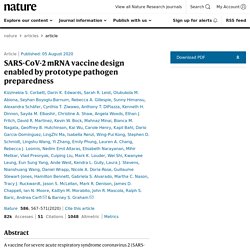
The experiments were not randomized. The investigators were not blinded to allocation during experiments and outcome assessment. Metiers biodiversite. COVID-19 vaccines: The new technology that made them possible. Days before her 91st birthday, Margaret Keenan became the first person in the world to receive the Pfizer-BioNTech COVID-19 vaccine outside of clinical trials.
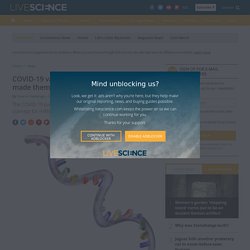
Keenan, who was sporting a polka-dot cardigan over a festive shirt, was given the first dose of a two-dose vaccine at the University Hospital Coventry in England, setting off the first mass vaccination effort against a virus that has now infected at least 70 million people worldwide and killed 1.5 million. An 81-year-old named William Shakespeare was next in line for the vaccine.
Keenan and Shakespeare are also the first humans, outside of a trial setting, to be given a vaccine that harnesses "mRNA" technology. This relatively new tech, which relies on a synthetic strand of genetic code called messenger RNA (mRNA) to prime the immune system, had not yet been approved for any previous vaccine in the world. Related: Coronavirus live updates Tapping into a natural process mRNA vaccines are inspired by basic biology. Swap the code. Covid Vaccine: Biometric Tracking Can Ensure Immunity. It’s Also a Privacy Risk. When Toby Norman was a graduate student at Cambridge’s Judge Business School in the early 2010s, he’d often visit Bangladesh to study its community health system, trying to understand what made high-performing health workers tick.
As he sweated over datasets, he spotted an unrelated, pervasive problem. Looking at workers in maternal-welfare programs, for instance, he saw that, after going from house to house to register pregnancies, “they’d want to follow up, to do antenatal screenings for things like anemia and preeclampsia,” he says. But “tracking patients over time was very hard, particularly in rural areas.” Covid-19 vaccines may have potentially unpleasant side effects. Pfizer is expected to seek federal permission to release its Covid-19 vaccine by the end of November, a move that holds promise for quelling the pandemic but also sets up a tight time frame to make sure consumers understand what it will mean to get the shots.
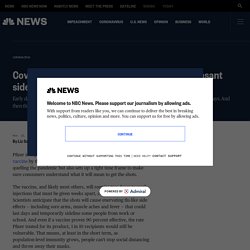
The vaccine, and likely most others, will require two doses to work, injections that must be given weeks apart, company protocols show. Scientists anticipate that the shots will cause enervating flu-like side effects — including sore arms, muscle aches and fever — that could last days and temporarily sideline some people from work or school. And even if a vaccine proves 90 percent effective, the rate Pfizer touted for its product, 1 in 10 recipients would still be vulnerable. That means, at least in the short term, as population-level immunity grows, people can't stop social distancing and throw away their masks.
Full coverage of the coronavirus outbreak "You need to be ready," he said. "A lot of folks don't have sick leave. A prefusion SARS-CoV-2 spike RNA vaccine is highly immunogenic and prevents lung infection in non-human primates. A prefusion SARS-CoV-2 spike RNA vaccine is highly immunogenic and prevents lung infection in non-human primates Annette B.
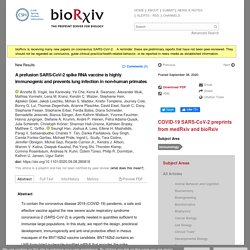
Cookie Consent and Choices. Will the coronavirus help mRNA and DNA vaccines prove their worth? Credit: Translate Bio Translate Bio is working with Sanofi Pasteur on an mRNA vaccine for COVID-19 Joseph Kim first heard about a mysterious pneumonia spreading in Wuhan, China, while watching the college bowl games on New Year’s Day.
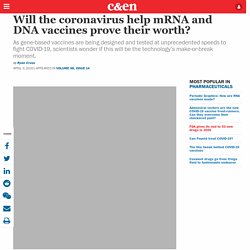
It was barely a blip in the news. A week later, when Kim was back at work at Inovio Pharmaceuticals, where he is CEO, he learned that Chinese scientists had identified a never-before-seen coronavirus as the cause of the illness. It was a potentially frightening finding. Kim was attuned to the gravity of the emerging outbreak. In early January, CEPI approached Kim with a proposition. Credit: Inovio Pharmaceuticals Inovio Pharmaceuticals CEO Joseph Kim, whose company is developing a DNA vaccine for COVID-19 On Saturday, Jan. 11—Friday, Jan. 10, in the US—Chinese scientists posted the first sequences of the novel coronavirus’s RNA genome online.
“It took less than 3 hours to complete,” Kim says.